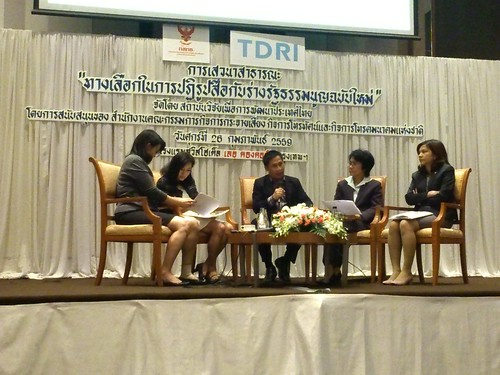Media experts said that the controversial draft constitution will provide the authorities with control mechanisms to keep the media at bay in the name of national security.
On Friday, 26 February 2016, Thailand Development Research Institute (TDRI) organised a public seminar on Alternatives for Media Reform under the New Charter at the Swissôtel Le Concorde in Bangkok.
The discussants at the forum were Pirongrong Ramasoota, a lecturer from the Faculty of Journalism of Chulalongkorn University, Boonlert Kachayuthadej, an advisor to the Subcommittee of Political Reform of the National Reform Steering Assembly (NRSA), and Supinya Klangnarong, Commissioner of the Office of the National Broadcasting and Telecommunications Commission (NBTC).

At the forum, Pirongrong said that unlike the 1997 and 2007 Constitutions, the latest draft constitution greatly limits the freedoms and liberties of the people because it states that the exercise of freedom and liberty must not ‘affect or cause danger to national security’.
She added that the right of communication for people and media will come under severe restrictions as it will become the business of the state. This is because Article 56 of the draft on the assignment of radio frequencies is placed under Chapter 5 of the new charter, the directive principles of fundamental state policies, instead of the Chapter on rights and liberties.
Article 56 of the new draft constitution reads “the state shall preserve the rights on radio frequencies and on [the permission to deploy] satellites in orbit which are national resources under the control and directives of the state.”
The Chulalongkorn lecturer also pointed out that the new draft constitution will also reduce the independence of the NBTC and restrain people’s rights further because unlike the 1997 and 2007 charters which stated that people shall participate in the management of the public radio frequencies, the new charter only states that people shall benefit from it in accordance with the law.
Pirongrong further pointed out that in contrast to the 1997 Constitution which emphasised decentralisation and democratisation of communication by increasing access to radio frequencies, the current draft constitution lays down many petty conditions to prevent this.
She summarised that these petty restrictions under the new draft might not be in line with the principles of the rule of law, but rule by law instead.
Analysing Chapter 2 on the Rights and Liberties of Thai People under the new draft constitution, Boonlert, an advisor to the NRSA political reform subcommittee, agreed with Pirongrong in saying that the draft charter does not ensure that the rights and liberties of the people will be protected.
He illustrated that on freedom of expression, Article 25 of Chapter 2 states that freedom of expression must not affect national security.
Boonlert added that Article 34 of Chapter 2 also restrains freedom of expression for the sake of national security by stating that the media must not incite conflict and hatred in society. He said that although many Thai media have had a role in escalating political crises in the nation in the recent past by abusing freedom of expression, it is more of an issue of media ethics and should not be written as a law in the constitution.
We already have many laws and acts on national security, such as Martial Law, the Emergency Decree, the Internal Security Act, together with Announcements and Orders issued by the National Council for Peace and Order (NCPO), said Boonlert.
In addition, Boonlert pointed out that besides putting restraints on media, Article 34 of the new draft constitution also stipulates that academic freedom must not contravene the duties of Thai people and must not affect public morale. As the draft charter states that the civic duties of the Thai people should not cause conflict and incite hatred, academic freedom will come under severe censorship under the new draft charter.
Academically, people should be able to freely conduct research, teach, and criticise, even court verdicts, said Boonlert at the discussion.
Supinya, an NBTC commissioner, said on media reform that although there are certain problems about the functions of the NBTC, the management of radio frequencies should not be altered greatly from the 2007 Constitution.
She said that when the price of the radio frequencies has now skyrocketed because many private business operators are competing at frequency auctions, it will be problematic if the state again monopolises the management of radio frequencies.
The NBTC commissioner concluded that, most importantly, the NBTC should remain as an independent state agency and allow the public to participate and criticise its decision making to make the organisation more transparent and accountable.
Prachatai English is an independent, non-profit news outlet committed to covering underreported issues in Thailand, especially about democratization and human rights, despite pressure from the authorities. Your support will ensure that we stay a professional media source and be able to meet the challenges and deliver in-depth reporting.
• Simple steps to support Prachatai English
1. Bank transfer to account “โครงการหนังสือพิมพ์อินเทอร์เน็ต ประชาไท” or “Prachatai Online Newspaper” 091-0-21689-4, Krungthai Bank
2. Or, Transfer money via Paypal, to e-mail address: [email protected], please leave a comment on the transaction as “For Prachatai English”
